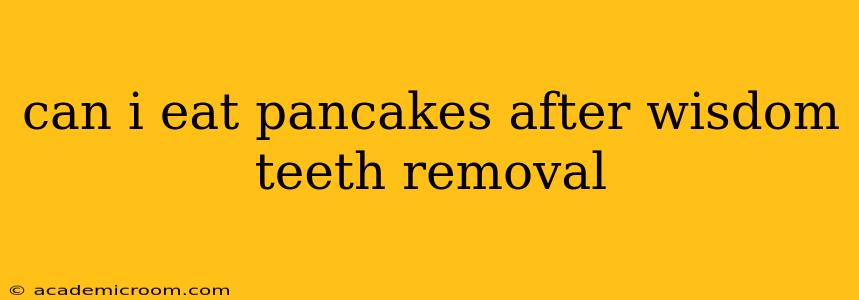Can I Eat Pancakes After Wisdom Teeth Removal? A Guide to Post-Surgery Diet
Having your wisdom teeth removed is a significant procedure, and recovering properly is crucial. One of the biggest questions patients have is about their diet, specifically, what they can and can't eat. Pancakes, a seemingly simple breakfast staple, are often a point of confusion. So, can you eat pancakes after wisdom teeth removal? The short answer is: it depends. Let's break it down.
What Can I Eat After Wisdom Teeth Removal?
Immediately after surgery, you'll likely be on a liquid diet for the first few days. This is because chewing can disrupt the healing process and increase the risk of bleeding and dry socket (a painful condition). Suitable options during this phase include:
- Broths: Chicken broth, bone broth, or vegetable broth provide essential nutrients and hydration.
- Smoothies: Blend fruits, vegetables, and yogurt for a nutritious and easy-to-consume meal.
- Applesauce: A soft, smooth option that's gentle on the gums.
- Yogurt: High in protein and beneficial bacteria, choose plain varieties to avoid added sugars.
- Jell-O: A hydrating and refreshing option.
What Makes Pancakes a Risky Choice After Wisdom Teeth Removal?
Pancakes, even if soft, present several challenges post-wisdom tooth extraction:
- Texture: While some pancakes might be softer than others, they still require some chewing. This chewing motion can dislodge blood clots forming at the extraction sites, leading to pain and complications.
- Crumbs: Pancakes can easily break into small crumbs, which can get lodged in the extraction sockets, causing irritation and infection.
- Ingredients: Some pancake recipes include nuts or seeds, which are strictly off-limits after surgery due to their size and hardness.
When Can I Introduce Pancakes Back Into My Diet?
The timing of when you can safely eat pancakes varies depending on your individual healing process and your surgeon's instructions. Generally, you should transition to a soft food diet after the initial liquid phase. This might include:
- Mashed potatoes: Easy to swallow and packed with nutrients.
- Scrambled eggs: Soft and easily digestible.
- Oatmeal: A gentle and nutritious option.
Once your wounds have healed significantly, and your surgeon gives the all-clear, you might cautiously try a very soft pancake. However, even then, proceed with extreme caution. Choose pancakes that are exceptionally soft and easily mashed with a fork. Avoid those with nuts, seeds, or large chunks of fruit.
What About Other Foods?
The transition from liquids to solids should be gradual. Your dentist or oral surgeon is the best source of information about a safe and healthy post-surgery diet. Always follow their recommendations, and don’t hesitate to ask if you have any doubts or concerns about specific foods.
Are There Specific Pancakes I Should Avoid?
Yes. Absolutely avoid pancakes with:
- Nuts or seeds: These can easily get lodged in the extraction sites.
- Hard fruits or berries: These are too firm and could cause damage.
- Large, crunchy pieces of anything: These should be avoided until your wounds are fully healed.
How Long Should I Wait Before Eating Solid Foods?
This will depend on your individual case and your surgeon's instructions. It's crucial to follow their advice, but generally, it might take a week or more before you can safely reintroduce solid foods into your diet.
In summary, while you might crave pancakes after your wisdom teeth removal, patience is key. Prioritize your healing process by following your surgeon's dietary recommendations and gradually reintroducing foods as your mouth recovers. Your comfort and successful healing should always come first.
